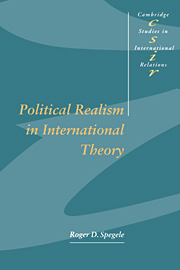Book contents
- Frontmatter
- Contents
- Preface
- Acknowledgements
- Part 1
- Part 2
- 4 Evaluative political realism: a beginning
- 5 State and state-systems in evaluative political realism
- 6 Evaluative political realism and human nature
- 7 Evaluative political realism and historical realism
- 8 Evaluative political realism as moral realism
- 9 Conclusion
- Notes
- Bibliography
- Index
- CAMBRIDGE STUDIES IN INTERNATIONAL RELATIONS
5 - State and state-systems in evaluative political realism
from Part 2
Published online by Cambridge University Press: 30 October 2009
- Frontmatter
- Contents
- Preface
- Acknowledgements
- Part 1
- Part 2
- 4 Evaluative political realism: a beginning
- 5 State and state-systems in evaluative political realism
- 6 Evaluative political realism and human nature
- 7 Evaluative political realism and historical realism
- 8 Evaluative political realism as moral realism
- 9 Conclusion
- Notes
- Bibliography
- Index
- CAMBRIDGE STUDIES IN INTERNATIONAL RELATIONS
Summary
Peut-on vraiment parler de système internationale?
Philosophie et relations internationales Philippe BraillardIntroduction
In Man the State and War Kenneth Waltz writes: ‘So fundamental are man, the state, and the state system in any attempt to understand international relations that seldom does an analyst, however wedded to one image entirely overlook the other two. Still, emphasis on one image may distort one's interpretation of the others.’ Although Waltz' use of the word ‘image’ delivers some unfortunate non-cognitive overtones, he is, nonetheless, fundamentally correct in underlining the importance of wheeling our conception of man, the state and state system into coherent line with one another at the very outset of our reflections on these subjects. Reserving our discussion of Homo sapiens for the next chapter, we shall focus our attention here on the state-system and the state and enunciate our first thesis for a revised and refurbished political realism.
THESIS ONE: The state-system and the state are sortal concepts which give objectivity to international relations by virtue of the state's essential property of external sovereignty.
Thesis One stands in marked contrast with two competing metaphysical assumptions which underpin alternative conceptions of international relations from within emancipatory international relations and positivist-empiricism. For classical Marxism (paradigmatically ‘emancipatory’ in our terms) there is no such thing as an ‘essential property’ since the world is constituted, ultimately speaking, of matter in motion: matter is the ultimate reality in space and in time.
- Type
- Chapter
- Information
- Political Realism in International Theory , pp. 102 - 126Publisher: Cambridge University PressPrint publication year: 1996

